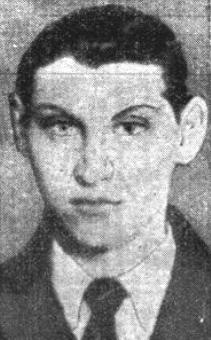Eugene Dido Kvaternik
Eugen "Dido" Kvaternik (born March 26, 1910 in Zagreb , † March 10, 1962 in Río Cuarto , Argentina ) was a Croatian Ustasha lieutenant general. He was the head of the police, as well as the intelligence and security services in the Independent State of Croatia (NDH). In addition, until 1942 all 22 concentration camps in the country were under his control. He played a major role in the NDH terrorist measures against Serbs , Jews and Roma .
Life
Eugen Dido Kvaternik was the son of the commander of the Croatian armed forces Slavko Kvaternik and his wife Olga (nee Frank, daughter of the HSP politician Josip Frank ). After graduating from school, he began studying law, which he did not graduate.
Kvaternik traveled a lot abroad, where he also met Ante Pavelić and other Ustaša officials. In 1933 Kvaternik fled the Kingdom of Yugoslavia after a failed assassination attempt on King Alexander I in Zagreb . Under a false name (Eugen Rakovečki, Egon Kramer) he led a second attempted assassination carried out by Wlado Tschernosemski . He spent two years in prison in Italy after being convicted in the subsequent trial . In 1936 he was released, after which he joined the exiled Ustaša members on the island of Lipari , whose command he became in early 1937 and stayed until the internment camp there was dissolved in April.

He returned to Croatia on April 13, 1941, just three days after his father declared the Independent State of Croatia . On April 18, he was appointed director of the Ravnateljstvo za javni red i sigurnost (RAVSIGUR) and on May 4, he was appointed State Secretary in the Ministry of the Interior under Andrija Artuković . In addition, he became head of the Ustaška nadzorna služba (UNS) established on August 16, and as such was responsible for the operation of all concentration camps in the Independent State of Croatia.
After a falling out with Pavelić, Kvaternik was relieved of all his offices in mid-September 1942. In 1943 he went into exile with his family, first to Slovakia , then to Austria and Italy. In 1947 he finally emigrated to Argentina. Here he was killed in a traffic accident in 1962.
family
Kvaternik met his future wife Marija Cvitković in the summer of 1941 and married her on January 10, 1942. The first son Slavko Eugen was born in October 1942, the second son Davor in August 1944 and the daughter Olga on April 2, 1951. Slavko later became professor of political science in Argentina and Davor cardiologist in Boston . With Eugen Kvaternik, his daughter Olga was killed in a traffic accident at the age of ten, while his wife and two sons survived.
Fonts
- Eugen Dido Kvaternik: Sjećanja i zapažanja, 1925–1945: prilozi za hrvatsku povijest [memories and observations, 1925–1945: contributions to Croatian history] . Ed .: Jere Jareb (= Biblioteka Ljudska Prava, Knjižnica Hrvatskog rukopisa ). Nakl. Društvo Starčević, Zagreb 1995, ISBN 978-953-96369-0-4 .
literature
- Zdravko Dizdar: KVATERNIK, Eugen Dido . In: Darko Stuparić (ed.): Tko je tko u NDH: Hrvatska 1941. – 1945 [Who is who in the NDH: Croatia 1941–1945] . Minerva, Zagreb 1997, p. 223-225 (Croatian).
Web links
- JUSP Jasenovac - EUGEN DIDO KVATERNIK
- Cracks in Context XXI
- Yves Tomic: " Kvaternik (1910-1962), Eugen Dido ", Online Encyclopedia of Mass Violence , June 7, 2010, ISSN 1961-9898 .
Individual evidence
- ↑ Milan Blažeković: Bio-bibliografski leksikon suradnika Hrvatske revije . Školske novine-Pergamena, Zagreb 1996, pp. 262–263. ISBN 953-160-107-0 .
- ↑ Marija Kvaternik (née Cvitković) in an interview with Tomislav Jonjić on May 23, 1997.
| personal data | |
|---|---|
| SURNAME | Kvaternik, Eugene Dido |
| ALTERNATIVE NAMES | Kvaternik, Eugen; Kvaternik, Dido (nickname) |
| BRIEF DESCRIPTION | Croatian Ustaša functionary and war criminal |
| DATE OF BIRTH | March 26, 1910 |
| PLACE OF BIRTH | Zagreb |
| DATE OF DEATH | March 10, 1962 |
| Place of death | Río Cuarto , Argentina |
